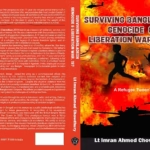As Bangladesh stands at a crossroads, facing both internal political challenges and complex regional dynamics, the Bangladesh Armed Forces (BAF) emerge as a pivotal institution capable of guiding the country toward stability, prosperity, and an inclusive political future. With a strong tradition of service and a commitment to national sovereignty, the Armed Forces hold the potential to play an active role in fostering socio-political stability, supporting a peaceful political order, and ensuring good governance that aligns with the aspirations of the Bangladeshi people.
A Historical Foundation: The Armed Forces’ Legacy in Bangladesh
Since Bangladesh’s inception in 1971, the Armed Forces have played an instrumental role in safeguarding national interests. Formed amid a fight for independence, they have since evolved into a highly professionalized and disciplined entity with a deeply embedded sense of duty toward preserving national sovereignty. This unwavering commitment to national sovereignty has reassured the Bangladeshi people about their country’s security. Over the decades, the Bangladesh Armed Forces has remained non-partisan, serving under the government of the day while staying out of the direct political arena. This balance has positioned them as a respected institution with public trust, allowing them to act as a stabilizing force in times of internal and external turbulence.
Securing National Sovereignty in a Shifting Geopolitical Landscape
With Bangladesh situated in a geostrategically sensitive area between India, Myanmar, and close to China, the Armed Forces are on the frontline of protecting Bangladesh’s sovereignty in an increasingly tense regional environment. The emergence of the Indo-Pacific as a contested geopolitical theater has amplified the need for military readiness and diplomatic dexterity. In this regard, the BAF contributes not only through national defense but also by fostering diplomatic relationships with neighboring countries.
Their collaboration with UN peacekeeping missions also bolsters Bangladesh’s international image, showcasing the BAF as peace enforcers on a global scale. Through strategic partnerships with allies and by maintaining a robust defense capability, the BAF remains a deterrent to external threats, helping preserve the nation’s sovereignty amidst shifting alliances and regional rivalries.
Maintaining Internal Stability Amid Political Turmoil
Bangladesh’s internal political landscape has seen cycles of tension, marked by confrontations between major political factions, public protests, and disputes over electoral outcomes. In this context, the Armed Forces serve as a force for internal stability, providing critical support in times of crisis. Their role in maintaining internal stability has been essential during periods of political unrest, providing a sense of security to the Bangladeshi people. While the Bangladesh Armed Forces is careful to maintain its apolitical stance, its presence has been essential during periods of political unrest. The Armed Forces assist civilian institutions in preserving order, especially during national emergencies, disasters, and elections, when tensions may run high.
During elections, for instance, the Armed Forces ensure a secure environment, allowing citizens to exercise their democratic rights without fear. Their impartial oversight is essential in preventing violence and upholding the sanctity of the electoral process, ensuring that the people’s will is respected and that Bangladesh’s democracy remains robust.
Supporting Good Governance and the Rule of Law
Good governance is a cornerstone of sustainable development, and the Bangladesh Armed Forces have a unique role in promoting transparency and accountability. The Bangladesh Armed Forces’s institutional discipline and commitment to ethical standards serve as an example for other state institutions. Through joint initiatives with law enforcement, they help uphold the rule of law, particularly in regions affected by crime or insurgency.
Moreover, the Armed Forces contribute to national development by collaborating on various civilian projects, particularly in areas of infrastructure, education, and health. The BAF’s involvement in infrastructure projects, such as road construction and bridge building, not only enhances the country’s connectivity but also creates employment opportunities. Military-led construction projects, rural infrastructure development, and emergency response initiatives underscore the BAF’s role in nation-building beyond the defense realm. By working with government ministries and agencies, the BAF aids in bridging gaps in governance, ensuring that remote and marginalized communities receive essential services and infrastructure support.
Fostering Social Cohesion and Equitable Progress
Bangladesh’s socioeconomic progress depends on a sense of unity and shared purpose among its people, and the Armed Forces play a significant role in promoting social cohesion. Their efforts to provide disaster relief, healthcare, and education in underserved areas strengthen community bonds and foster a spirit of inclusivity. During natural disasters like cyclones and floods, the Armed Forces respond swiftly, providing rescue operations, medical assistance, and shelter to affected populations, often in areas where civilian government resources are scarce. This humanitarian role of the BAF is a testament to their commitment to the welfare of the Bangladeshi people.
This active presence in local communities helps build a rapport between the Armed Forces and the people, fostering mutual respect and understanding. By bridging social divides and delivering services equitably, the BAF contributes to reducing socio-political disparities, creating an environment of trust and collaboration that is essential for a stable society.
Building an Inclusive Political Order and Governance Structure
In addition to supporting civilian authorities, the Bangladesh Armed Forces contribute to fostering an inclusive political order that respects the rule of law and democratic principles. By upholding electoral integrity, they play a crucial role in ensuring that all political voices are heard and respected. The Bangladesh Armed Forcess role in ensuring fair and transparent elections, from providing security to overseeing the voting process, is a key aspect of their commitment to democracy. Their non-partisan stance provides a model for other institutions and reinforces the importance of impartiality in governance.
As the country faces challenges related to governance and public trust in institutions, the Bangladesh Armed Forces’scommitment to transparency and accountability can act as a catalyst for broader institutional reforms. Through collaborations with civilian agencies, the BAF helps enhance governance structures and support initiatives that promote human rights, civic education, and democratic values. This involvement helps build a political culture based on integrity, inclusivity, and respect for the rights of all citizens.
Empowering Bangladesh as a Growing Economic Powerhouse
A stable and secure environment is essential for economic development, and the Bangladesh Armed Forces contribute to creating this foundation. By safeguarding national sovereignty and supporting law and order, the Bangladesh Armed Forces provides the stability necessary for economic growth and foreign investment. Furthermore, their involvement in infrastructure projects and disaster management ensures that economic disruptions are minimized, even in times of crisis.
Bangladesh’s economic aspirations include becoming a middle-income country and a regional trade hub. The Armed Forces’ efforts in maintaining security, promoting resilience, and building critical infrastructure align with these goals, enabling Bangladesh to attract foreign investors and foster local entrepreneurship. By supporting development projects and securing trade routes, the Bangladesh Armed Forces actively contributes to the nation’s economic ambitions, creating conditions for a prosperous and resilient economy.
The Path Forward: Challenges and Opportunities
While the Bangladesh Armed Forces have a significant role in supporting national progress, their involvement must remain balanced with respect to civilian governance structures. The military’s primary role is defense and national security, and while their support in governance and development is invaluable, they must carefully navigate the boundaries to avoid overreach. A symbiotic relationship between the Bangladesh Armed Forces and civilian authorities, based on mutual respect and clearly defined roles, will be crucial in ensuring that the Armed Forces’ contributions enhance, rather than hinder, democratic governance.
Looking ahead, Bangladesh’s future rests on a collaborative approach where the Armed Forces, government, civil society, and the private sector work together to achieve shared goals. Continued investment in military training, technological advancement, and regional diplomacy will further empower the BAF to meet emerging challenges and secure Bangladesh’s place as a peaceful, prosperous nation.
Conclusion: A Vision of a Tranquil and Progressive Bangladesh
In an era of uncertainty, both domestically and globally, the Bangladesh Armed Forces represent a pillar of strength, stability, and progress. Their commitment to national security, public welfare, and institutional integrity underscores their vital role in shaping a peaceful, progressive, and economically vibrant Bangladesh. As the country looks to the future, the BAF’s continued dedication to upholding sovereignty, fostering social cohesion, and supporting democratic governance will be essential for building an equitable and resilient society.

In the coming years, the Armed Forces’ contributions can help Bangladesh achieve its vision of becoming a middle-income nation, a regional economic powerhouse, and a beacon of peace and stability in South Asia. Through their service, the Bangladesh Armed Forces not only protect the nation’s borders but also build bridges within society, creating a foundation for a future of shared prosperity and unity.
Imran Chowdhury BEM is a respected strategic thinker, renowned for his insightful analysis of geopolitical issues, history, and diaspora affairs. As an author of numerous books and over a thousand newspaper articles, he brings a seasoned perspective to global politics, focusing on social cohesion and the dynamics of South Asian geopolitics. His writings explore the intersections of history, sovereignty, and the Bangladeshi diaspora’s role within broader socio-political landscapes. Imran’s deep understanding of cultural identity and global alliances has positioned him as a leading voice in promoting cultural preservation, community empowerment, and nuanced discourse on international relations.



